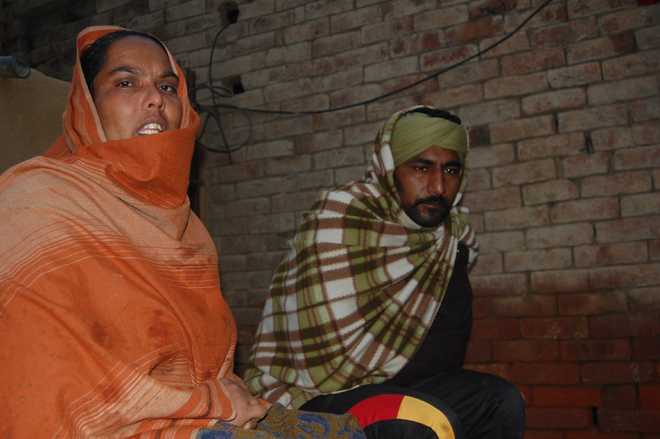
Harjit Singh and his wife Paramjeet Kaur and his grandfather Jagir Singh (holding a picture of one of his three deceased sons). photos by writer
Vishav Bharti
Tribune News Service
alkara (barnala), January 20
Alkara village has a population of 2,019. A Punjab Agricultural University survey carried out in September last year put at 14 the number of those from the village who committed suicide between 1991 and 2015. Of them, four were farmers and 10 agricultural labourers. Harjit Singh has made six attempts to be number 11. Death chose life for him each time, but the 28-year-old seems to have no inclination to carry on.
Neither does his bed-ridden grandfather Jagir Singh, who has seen three of his four sons, all farm labourers, end their lives. “Mainu moohon mangiyan maut ni mildi (I wish for death, it doesn’t oblige),” he says. Harjit had inherited debt as a boy after his father committed suicide in 1996.
It was early 1990s and Jagir Singh was a daily-wager. His eldest son Gamdoor Singh, who was in his mid-20s, was an attached labourer with a village landlord from whom he would borrow money for his daily needs. After several years of work and taking home just a part of the wages, the landlord one day told him he owed him money. He could pay him and be free. Gamdoor Singh consumed pesticide.
The baton was passed on to his younger brother Gurdeep Singh. He took to working under the same landlord. The story repeated itself when after hard labour of a year, the landlord told him that his debt had increased. “He consumed spray pesticide in the very field that he worked in,” says Sewak Singh, Jagir Singh’s only surviving son. Both were unmarried.
Three years later, the story played out yet again, only the landlord was different. Jagir Singh’s third son Gurmail Singh was told by the landlord he was attached to for three years that he owed him money. He too consumed pesticide.
Three deaths, no pictures of the dead, the only common link is pesticide.
Harjit Singh was eight when father Gurmail Singh ended life to escape the cycle of debt. “My mother remarried,” says Harjit, who inherited the debt. At the age of 10, he started working as a daily-wager along with his grandfather Jagir Singh. “I would be paid half of the adult wages,” he says. A few years later, when he grew up, Jagir Singh’s debt was divided between him and his uncle Sewak Singh. His share came to Rs 1.25 lakh. Soon, people whom he owed money started making their never-ending visits.
And then followed attempts to kill himself and “set myself free”, as he puts it. Harjit says he has not bought a new piece of clothing for years together. “Whatever people gave, I wore. This blanket has never parted me, and that is something people often poke fun of. You call it a life?” Harjit breaks down suddenly.
He points to a pigeon coop behind him. “I kept spray (pesticide) here for several days following humiliation at the hands of moneylenders,” he says. And then one day his wife Paramjeet Kaur saw it in his hand. “The lid was open. I pushed him. The bottle fell down and it spilled. The entire neighborhood gathered,” Paramjeet rushes to her room, her sobs audible in the courtyard.
After some time, she returns and continues: “I told him not to worry. We will work together and pay back the debt. But he should never do that again.”
However, neither was that the first attempt, nor the last. He shares the names of people who saved him from dying. The pesticide figures in the conversation again and again.
Harjit’s son Balkar was a toddler when the couple started travelling to faraway places to pick cotton for better wages. “The jewellery my parents gave me on our wedding was sold off for Rs 25,000 to clear some debt. We would work together and we brought our life back on line,” she says.
Her optimism has not rubbed off. “My life has almost passed. I am almost dead,” he says and points toward the school-going eight-year-old Balkar. “He will grow up in a few years and take care of his mother.”
Paramjeet throws up her hands in despair. What is she supposed to do? What is Harjit Singh supposed to do?



























